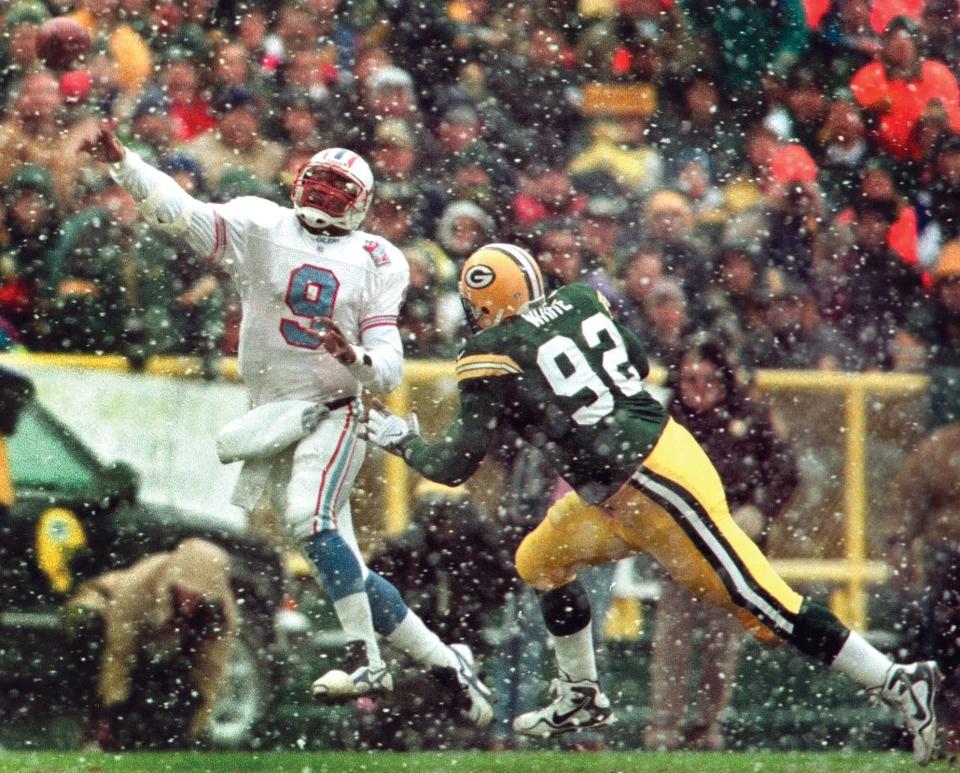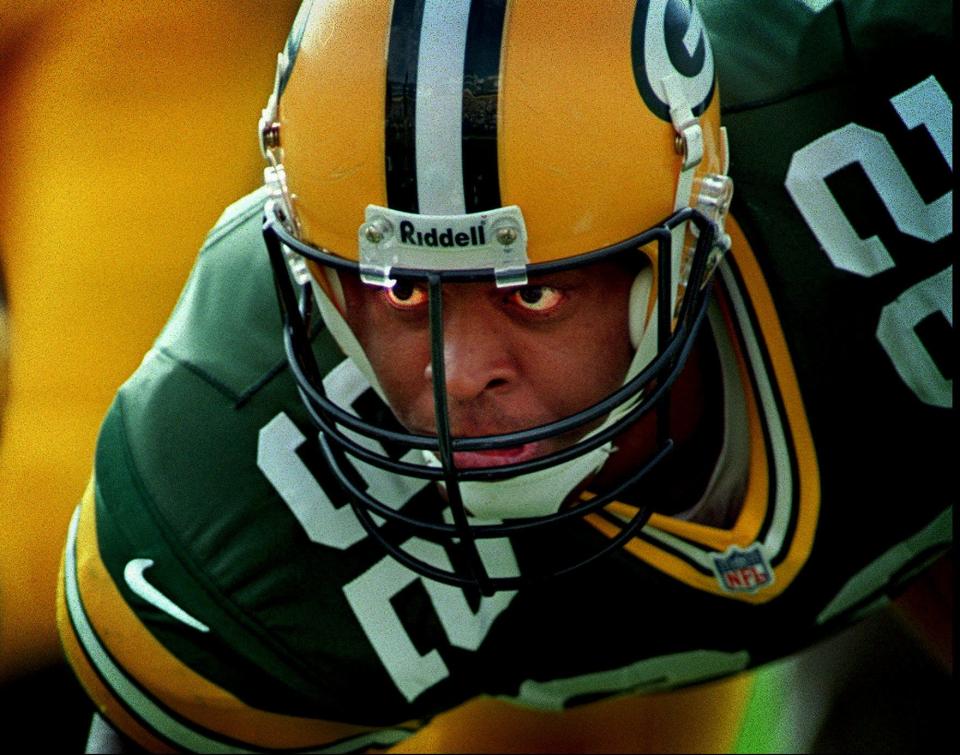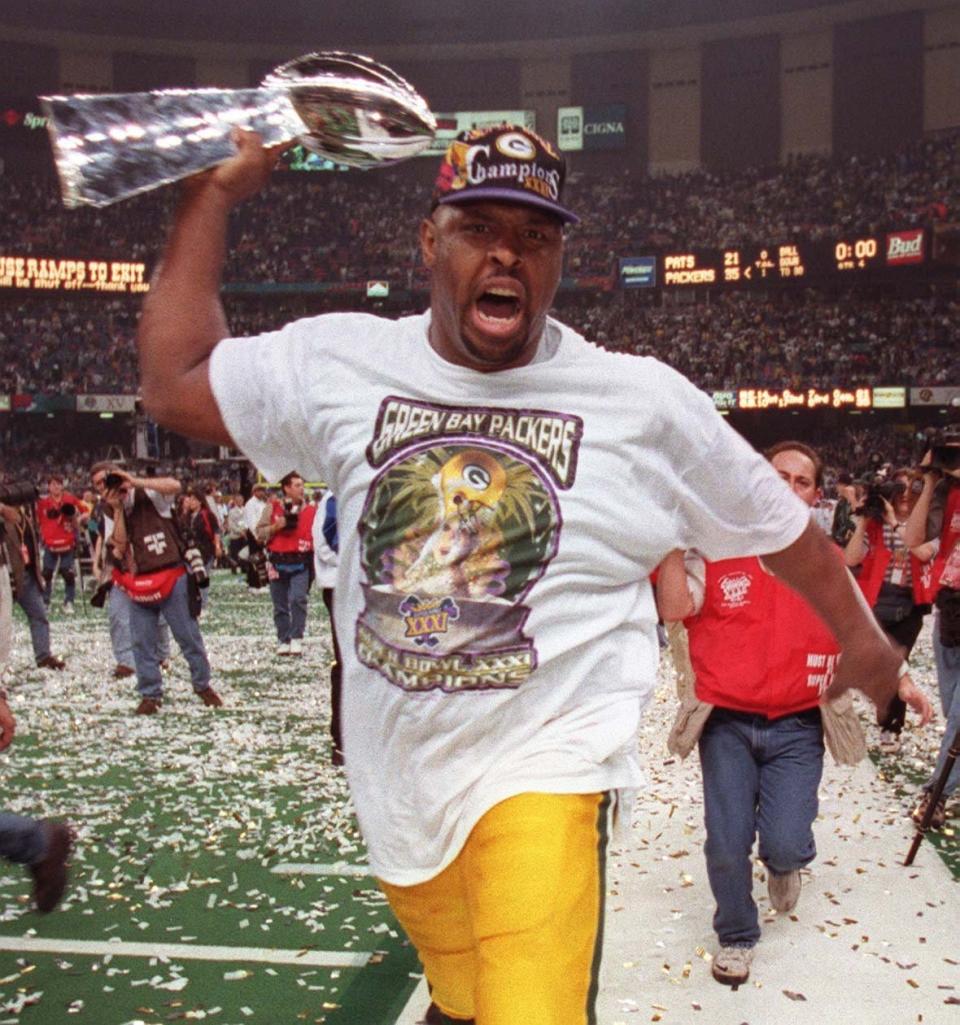Reggie White signing as a free agent changed the course of Green Bay Packers history
Siberia had a new Minister of Tourism.
It's hard to overstate the sea change that came with the Reggie White signing in Green Bay. In 1993, the Packers weren't one of the preeminent football franchises in the National Football League, despite a legendary legacy of success in the Lombardi Era. They were merely a quaint curiosity in small-town America, desperately trying to dig out of a quarter-century of mediocre football.
And then, in April 1993, Packers team negotiator Mike Reinfeldt walked into team president Bob Harlan's office and told him the good news. White, or the Minister of Defense, if you prefer, was willing to sign in Green Bay for four years and $17 million. It was announced April 6, 1993.
"All I said to (head coach Mike) Holmgren was, 'This improves your football team, doesn't it?'" Harlan said. "He said, 'It sure does.'"
White was joining a team that had been to the playoffs just twice in 25 years since winning the first two Super Bowls. No Packers lineman had more than five sacks in a season since 1985, and the 1992 team had ranked 23rd in the league on defense, despite a promising first season at 9-7 with first-year coach Holmgren and young quarterback Brett Favre.
The seven-time Pro Bowler with the Philadelphia Eagles was 31 at the time, one year removed from a Defensive Player of the Year award and 2½ sacks away from matching Lawrence Taylor for the most in NFL history.
As Dale Hoffman wrote in the Milwaukee Sentinel: "This isn't the NFL penthouse yet, but it's not the woodshed anymore, either."
White had 13 sacks in his first year, never had fewer than eight in his six seasons with the Packers and averaged more than 11. He was the heart of the Packers renaissance with ripple effects being felt a generation later.
“Before that decision, guys would say, ‘If Green Bay drafts me, I don’t want to go.’ It was Siberia,” Packers tight end Keith Jackson told Sports Illustrated. “But Reggie White saw something different about it. … Reggie saw all these positives about Green Bay that nobody really knew about. He saw it as an opportunity to go somewhere where the people are super fans. And when you lose a game, there’s nobody screaming at you, saying you’re a bum. The media is reporting the facts and not trying to create a controversy. It was actually an oasis to play football, and you really concentrated on being a football player.”
Free agency was still a blossoming concept in the NFL at large

White's arrival also marked a new era for the NFL at large.
A Minneapolis federal court ruled in 1992 that the NFL's "Plan B" free-agency format violated antitrust laws. In previous offseasons, NFL teams had the right to protect 37 players on every team from leaving for another destination.
The economics of the NFL changed dramatically in the aftermath. Any veteran with at least five years of experience (later lowered to four) could now become an unrestricted free agent, with the exception of players who were given the "franchise" or "transition" tags. In 1994, the league-wide salary cap was also introduced, forcing teams to manage their finances more smartly ... and perhaps give a smaller market like Green Bay an opportunity to remain highly competitive.
White was at the forefront of the movement as one of the named plaintiffs in the lawsuit against the NFL that got the ball rolling. And then, he cashed in, accepting the biggest contract offer on the table from the team in best position to offer.
Washington had won three Super Bowls and had been to the playoffs eight times since 1982. San Francisco had won four Super Bowls and been to the playoffs 10 times since 1981. Both were considered major players to land White — the Boston Globe even reported that the 49ers had agreed to terms on a $14 million deal. The Packers, meanwhile, hadn't won a division title since 1972.
White famously later said that God pointed him in Green Bay's direction. But ... the money didn't hurt.
"I think there were certain teams that really thought they were going to get a break on this contract because they were proven winners over the last 10 years," said White's agent, Jimmy Sexton. "They really had the attitude, 'We'll get you in 4 or 5 million cheaper than anybody else because we'll play out this 'wanting to win.' I think that backfired. I think when they got in it, they really found out Reggie wants to go to a place that he can win, but he really believes Green Bay can win."
Sexton's ticket to the NCAA men's basketball championship in the Louisiana Superdome went unused as he placed the home-stretch phone calls to teams from his hotel in New Orleans. He didn't get to see Chris Webber's famous costly timeout call in person as he orchestrated a different watershed sports moment.
"We shocked the world, didn't we?" he added.
After the fact, Washington was said to hesitate going beyond $13 million with their offer. Under tighter financial restrictions than Green Bay, the 49ers could offer no more than $19.5 million over five years. White became the third-highest paid player in the league behind John Elway and Dan Marino.
"I feel the dollars offered by Green Bay were just far too much to overcome," 49ers president Carmen Policy said. "Without guaranteeing the contract, which we wouldn't do, we couldn't come close to matching the deal."
Ray Rhodes helped seal the deal to convince White on the Packers

The novelty of the process and the profile of the talent ensured that White's tour of NFL cities was a highly publicized affair. On March 10, he came to Green Bay, admitting that it was mostly because he'd been in the neighborhood the night before in Detroit. He toured Lambeau Field and met team personnel. Later, Holmgren and defensive coordinator Ray Rhodes flew to White's home in Knoxville, Tennessee.
"I think Ray Rhodes had a lot to do with my decision," White said. "I think Ray is trying to move his defensive unit in the right direction. I think the thing I'm impressed with is that he's going to give guys an opportunity to have some input into what he's doing defensively."
Packers general manager Ron Wolf, whose moves to acquire Favre and White set the course for a massive turnaround, said he never approached the situation as an "Oh, poor me" situation, "like we're the third rung on the tier."
"They were smart enough and perceptive enough to know that Reggie was a relationship guy," Sexton said. "They sold him on the fact that it's like a big college atmosphere. He was coming out of a place where it wasn't fun for him the last couple years. But if I had to pick one thing he liked most about Green Bay, Holmgren was it."
White acknowledged that money was a factor, "but when I talk to drug dealers and ask them how they can do what they do when they're killing people they say, 'If you get us a job, we'll stop.' Maybe the money will give me a chance to build some buildings and create some jobs in the inner city."
That mission fell in line with White's approach to life as a licensed Baptist minister who had preached in more than 100 churches. Perhaps it was in that perspective he saw something redeeming in Green Bay.
"Green Bay's always been an underdog," White said. "Coaches would tell a player, 'If you don't get your act together, we're going to ship you to Green Bay ... I think every team was shocked I picked Green Bay."
Reggie White changed the perception of Green Bay football

Harlan called it the most momentous day of his career.
"I hope this signing will be a shot in the arm for the whole state of Wisconsin," he said.
The Packers went to the playoffs in 1993 and beat Detroit in a thrilling first-round battle. With Favre leading the offense and White anchoring the defense, Green Bay became an annual contender and won the franchise's third Super Bowl after the 1996 season.
"I tell you, people are going to be peeking over their shoulders at Green Bay," Packers safety LeRoy Butler said after the signing. "We were 9-7 without him. Now with him and a few others, it's just getting real exciting. We're hoping the season starts tomorrow.
"I think the defensive backs are the most thrilled of anybody. It means we might get more pressure, more picks, everything."
It wasn't a move completely devoid of risk; White was 31, after all.
"He's still is better than most of them even if he is halfway down the back side of the mountain," an unnamed NFC East official was quoted as saying in the Milwaukee Journal. "I think you can get maybe two good years. A third year would be OK. The fourth year would be a little scary to me."
White ultimately played six years with the Packers before retiring. He was named NFL Defensive Player of the Year in his sixth and final year, 1998, when he recorded 16 sacks. He also received a first-team All-Pro plaudit in 1995 and made the Pro Bowl every season.
"We've improved our defense dramatically," Wolf said. "Realistically, the best step we've made was the hiring of Mike Holmgren, but this was a very key move."
Three years after Reggie White's arrival, the Packers had a Super Bowl team
Perhaps more than any other moment on the list, it endures significantly. The Packers reached back-to-back Super Bowls, bringing in supplemental players like Jackson, Sean Jones, Andre Rison and others who perhaps wouldn't have come to Green Bay under different circumstances.
The Packers immediately transitioned from also-ran status for 25 years to a quarter century of top-tier status in the NFL. Sure, the back-to-back Hall of Fame quarterbacks probably had more to do with it.
White came out of retirement and played one last year with the Carolina Panthers, and he finished his career with 198 sacks — still second-most all time behind Bruce Smith. His No. 92 has been retired by the franchise, and he was posthumously inducted intothe Pro Football Hall of Fame in 2006.
White tragically died at age 43 in 2004, the victim of cardiac arrhythmia brought on by sleep apnea and an inflammatory condition called sarcoidosis that impacted several organs.
The Packers (sort of) did it again when they signed Charles Woodson
The similarities between the franchise signing White and Charles Woodson are eerie, although Woodson signed with far less fanfare.
Though the trail had been blazed to make Green Bay a favorable destination, Woodson didn't want to play there. But in 2006, the Packers were the only team making a serious offer for the cornerback who had broken his leg the previous season and played in only six games for the Oakland Raiders.
It worked out for everyone involved.
Woodson, who joined the Packers at age 30, appeared in four consecutive Pro Bowls from 2008 through 2011 and, like White, earned two All-Pro nods and a league Defensive POY Award in 2009. He led the league in interceptions twice during his tenure, notably in 2009 when he picked off nine passes, and he was one of the stars of the 2010 team that went on to win a Super Bowl.
He was inducted into the Pro Football Hall of Fame in 2021.
“I’m always going to be connected,” Woodson said years later. ... "There’s always going to be love between me and Green Bay.”
Note: This story first appeared in 2020 as part of the "50 in 50" series, a countdown of the 50 greatest moments in Wisconsin sports history over the preceding 50 years. This is No. 5.
Rules of the 50 in 50 series
Moments are recorded over the 50-year window from 1970 to 2019 (sorry 2020, but you're disqualified)
These are moments and not achievements, although that largely goes hand-in-hand.
These are "greatest" 50 moments, so you won't see moments that are pivotal but ultimately heartbreaking (like the NFC Championship loss to Seattle, Kareem getting traded, etc.)
You also won't see (many) moments that came to be recognized for their greatness later, such as the day the Bucks drafted Giannis Antetokounmpo or the day the Packers traded for Brett Favre.
Moments considered include teams based in Wisconsin and Wisconsin athletes competing in individual sports or as part of national teams (such as the Olympics), or moments on Wisconsin soil.
These are singular moments. You're supposed to remember where you were when they happened.
JR Radcliffe can be reached at (262) 361-9141 or jradcliffe@gannett.com. Follow him on Twitter at @JRRadcliffe.
More of the 50 greatest Wisconsin sports moments of the past 50 years
No. 50: Kulwicki's Polish Victory Lap
No. 49: David Gilreath takes it to the house
No. 48: Giannis in the Garden
No. 47: Tiger Woods greets the world
No. 46: Sam Dekker at the state tourney
No. 45: Miracle in the Metrodome
No. 44: Rodgers finds Cook in Dallas
No. 43: Lambeau Leap is born
No. 42: Aaron Rodgers tumbles in 2005
No. 41: Al Harris pick-six against Seattle
No. 40: Paul Molitor's hitting streak
No. 39: Bronson Koenig beats the buzzer
No. 38: Yelich and Cain on the same day
No. 37: Doc Rivers stuns Notre Dame
No. 36: Ray Allen in Game 6
No. 35: Badgers at the Bradley Center
No. 34: Russell Wilson in Big Ten title game
No. 33: The 1980 Brewers blockbuster
No. 32: Dan Jansen finally strikes gold
No. 31: UWM rampages to Sweet 16
No. 30: Jane Pettit donates the Bradley Center
No. 29: UWGB stuns Cal
No. 28: Al McGuire jumps on the table
No. 27: Badgers make thrilling run in 2000
No. 26: Baseball returns to Milwaukee
No. 25: Juan Nieves throws a no-hitter
No. 24: Brewers acquire CC Sabathia
No. 23: Bucks acquire Oscar Robertson
No. 22: George Petak switches his vote
No. 21: Wide open Randall Cobb
No. 20: The Hail Mary in Motown
No. 19: Robin Yount reaches 3,000 hits
No. 18: Game 163
No. 17: Bevell, Badgers win Rose Bowl
No. 16: Nyjer Morgan gives Brewers a playoff winner
No. 15: Mark Johnson scores twice in Miracle on Ice
No. 14: BJ Raji takes it to the house
No. 13: Dwyane Wade carves up Kentucky
No. 12: Ryan Braun sends Brewers back to playoffs
No. 11: Easter Sunday
No. 10: Eric Heiden wins record fifth gold
No. 9: Ron Dayne storms into record books
No. 8: Badgers beat undefeated Kentucky
No. 7: Marquette wins thriller in 1977 semifinal
No. 6: Favre wins one for his father
No. 5: Reggie White signs with Packers
No. 4: Bucks win 1971 NBA title
No. 3: Cooper's hit gives Brewers first pennant
No. 2: The Packers win Super Bowl XLV
No. 1: Howard's returns spark Super Bowl XXXI run
'The Next Ten'
No. 51: Abdul-Jabbar's winning skyhook in 1974
No. 52: Favre finds Sharpe for breakthrough playoff win
No. 53: Yount goes 4 for 4 in Game 5 of 1982 World Series
No. 54: Antonio Freeman's Monday Night winner
No. 55: Brandon Woodruff takes Clayton Kershaw deep
No. 56: Yancey Thigpen's drop gives Packers division title
No. 57: Marquette reaches 1974 NCAA final
No. 58: Jamar Fletcher's pick-six is Rose Bowl dagger
No. 59: Badgers football delivers a stunner to No. 1 Michigan
No. 60: Brewers survive in 1982 finale
'The Next 40'
61-70 From instant replay game to Freddie Owens' winner
71-80 From UW's first hockey title to Villanova stunned twice in same season
81-90 From the Brewers clinching in 1981 to the Bucks in the draft lottery
91-100 From Andy North to a legendary high-school streak
This article originally appeared on Milwaukee Journal Sentinel: Reggie White signing in 1993 altered Green Bay Packers history
